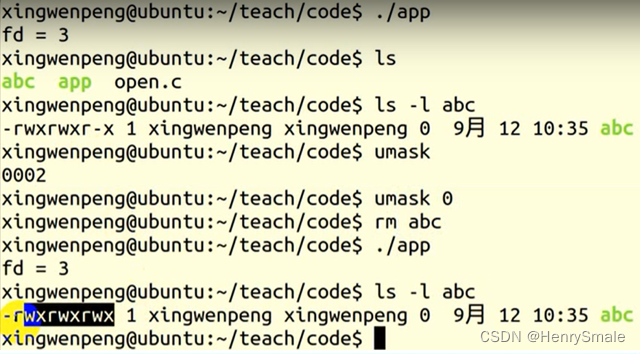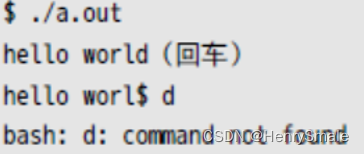1 文件I/O
open()
read()
write()
lseek()
close()
1.1 open函数
#include <fcntl.h>
int open(const char *pathname, int flags[, mode_t mode);
open函数参数说明:
- pathname:待打开文件的文件路径名;
- flags:访问模式,常用的宏有:
– O_RDONLY:只读
– O_WRONLY: 只写
– O_RDWR: 读写
– O_CREAT: 创建一个文件并打开
– O_EXCL: 测试文件是否存在,不存在则创建
– O_TRUNC: 以只写或读写方式成功打开文件时,将文件长度截断为0
– O_APPEND: 以追加方式打开文件
只有第二个参数flags = O_CREAT,第三个参数才会被用于设置新文件的权限,取值如下:
- S_IRWXU: 文件所有者,读、写、执行
- S_IRUSR: 文件所有者,读
- S_IWUSR: 文件所有者,写
- S_IXUSR: 文件所有者,执行
- S_IRWXG: 文件所属组,读、写、执行
- S_IRGRP: 文件所属组,读
- S_IWGRP: 文件所属组,写
- S_IXGRP: 文件所属组,执行
- S_IRWXO: 其他人,读、写、执行
- S_IROTH: 其他人,读
- S_IWOTH: 其他人,写
- S_IXOTH: 其他人,执行
返回值说明:
- 调用成功,返回一个文件描述符
- 不成功,返回-1
例: 创建一个文件
open(pathname, O_WRONLY|O_CREAT|O_TRUNC, mode);
or
int create(const char *pathname, mode_t mode);
【案例 1】创建一个文件,设置权限为0777。
#include <stdio.h>
#include <stdlib.h>
#include <unistd.h>
#include <fcntl.h>
#include <string.h>
int main(){int tempFd;tempFd = open("abc", O_CREAT, 0777);printf("fd = %d\n", tempFd);return 0;
}//of main
问题:为什么fd = 3? 为什么abc文件权限是775?

【案例 2】最多能打开多少个文件?
#include <stdio.h>
#include <stdlib.h>
#include <unistd.h>
#include <fcntl.h>
#include <string.h>
int main(int argc, char *argv[]){int tempFd;char tempName[1024];int i = 0;while (1) {sprintf(tempName, "file%d", ++i);tempFd = open(tempName, O_CREAT, 0777);if (tempFd == -1) {exit(1);}//of ifprintf("%d\n", i);}//of whilereturn 0;
}//of main
问题:为什么是1021?不是1024?

答:因为有stdin, stdout, stderr三个文件默认打开
几个有用的命令:
- cat /proc/sys/fs/file-max
查看当前系统允许打开最大文件个数 - ulimit –a
当前默认设置最大打开文件个数1024 - ulimit –n 4096
修改默认设置最大打开文件个数为4096
1.2 read函数
#include <unistd.h>
ssize_t read(int fd, void *buf, size_t count);
read函数参数说明:
- fd: 从open或create函数返回的文件描述符
- buf: 缓冲区
- count: 读取数据的字节数
返回值说明:
- ssize_t: 有符号的size_t,有三种返回值
– 正数:请求读取的字节数
– 0: 文件长度有限,若读写位置距文件末尾只有20字节,该函数请求读取30字节,则第一次读取时返回值为20,第二次读取时,返回0
– -1: 读取文件出错
特殊说明: read函数从设备或网络中读数据,如从终端读取数据,终端写入数据没回车,这些数据不会传给read函数,read函数就会一直阻塞;如从网络端读取数据,网络通信的socket文件没有数据,read函数同样会阻塞。
【案例 3】阻塞读,超过字符数会出现什么问题。
#include <unistd.h>
#include <stdlib.h>
int main(void) {char buf[10];//十个字符int n;n = read(STDIN_FILENO, buf, 10);if (n < 0) {perror("read STDIN_FILENO");exit(1);}//of ifwrite(STDOUT_FILENO, buf, n);return 0;
}//of main
问题:为什么会出现命令找不到?

答:超过10个字符,read只读取了10个字符,剩下的字符保存在内核的终端设备输入缓冲区
a.out退出,Shell进程继续从终端读走剩下的字符d和换行符,把它当成一条命令,结果发现执行不了。
1.3 write函数
#include <unistd.h>
ssize_t write(int fd, void *buf, size_t count);
write函数参数说明: 同read函数
返回值说明: 返回写入的字节数或者-1并设置errno
特殊说明: 向终端或网络端写数据时,可能会进入阻塞状态
1.4 lseek函数
#include <unistd.h>
ssize_t lseek(int fd, off_t offset, int whence);
lseek函数参数说明:
- fd: 从open或create函数返回的文件描述符
- offset: 对文件偏移量的设置,参数可正可负
- whence: 控制设置当前文件偏移量的方法
– whence = SEEK_SET: 文件偏移量被设置为offset
– whence = SEEK_CUR: 文件偏移量被设置为当前偏移量+offset
– whence = SEEK_END: 文件偏移量被设置为文件长度+offset
返回值说明:
- 设置成功:返回新的偏移量
- 不成功:-1
1.5 close函数
#include <unistd.h>
int close(int fd);
返回值说明:
- 成功:返回0
- 不成功:-1
2 案例
【案例 4】 使用open函数打开或创建一个文件,将文件清空,使用write函数在文件中写入数据,并使用read函数将数据读取并打印。
#include <stdio.h>
#include <stdlib.h>
#include <unistd.h>
#include <fcntl.h>
#include <string.h>
int main(){int tempFd = 0;char tempFileName[20] = "test.txt";//Step 1. open the file.tempFd = open(tempFileName, O_RDWR|O_EXCL|O_TRUNC, S_IRWXG);if(tempFd == -1){perror("file open error.\n");exit(-1);}//of if//Step 2. write the data.int tempLen = 0;char tempBuf[100] = {0};scanf("%s", tempBuf);tempLen = strlen(tempBuf);write(tempFd, tempBuf, tempLen);close(tempFd);//Step 3. read the filetempFd = open(tempFileName, O_RDONLY);if(tempFd == -1){perror("file open error.\n");exit(-1);}//of ifoff_t tempFileSize = 0;tempFileSize = lseek(tempFd, 0, SEEK_END);lseek(tempFd, 0, SEEK_SET);while(lseek(tempFd, 0, SEEK_CUR)!= tempFileSize){read(tempFd, tempBuf, 1024);printf("%s\n", tempBuf);}//of whileclose(tempFd);return 0;
}//of main



















